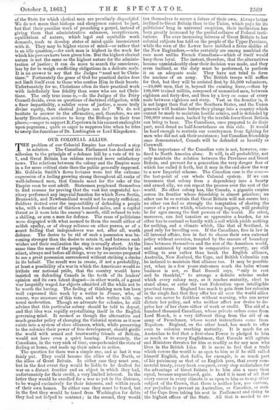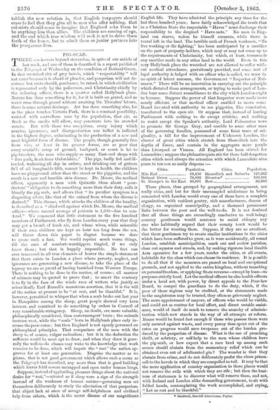OUR COLONIAL ALLIES. T HE problem of our Colonial Empire has
advanced a step to solution. The Canadian Parliament has declared its adhesion to the principle of a defence bill by a vote of 88 to 7, and Great Britain has seldom received more satisfactory news. The relations between the colony and the Empire were in a far more critical state than the public generally supposed. Mr. Goldwin Smith's fierce lectures were but the extreme expression of a feeling growing strong throughout all ranks of well-informed men, that Canada must for the sake of the Empire soon be cast adrift. Statesmen perplexed themselves to find reasons for proving that the vast but ungrateful ter- ritory performed any imperial function for which Nova Scotia, Brunswick, and Newfoundland would not be amply sufficient. Soldiers fretted over the impossibility of defending a people who, with a frontier of thirteen hundred miles, and a capital thrust as it were into the enemy's mouth, still refused to vote a shilling, or arm a man for defence. The mass of politicians were disgusted with what seemed to them the result either of selfish apathy, or of sleepy reliance on other purses, or of a secret feeling that independence was not, after all, worth defence. The desire to be rid of such a possession was be- coming stronger than the desire to retain it, and between such wishes and their realization the step is usually short. At the same time the mass of the people, who are Imperialists by in- stinct, always and before all things, were by no means prepared to see a great possession surrendered without striking a stroke in its behalf. The result was to create, if not a probability, at least a possibility of a war in which the Americans would so irritate our national pride, that the country would have insisted on defending Canada in the teeth of its leaders' opinion and its own latent disgust—in other words, of a great war languidly waged for objects admitted all the while not to be worth the having. The feeling of thinking men has been well expressed this week by a writer in Fraser, who, of course, was unaware of this vote, and who writes with un- usual moderation. Though an advocate for colonies, he still advises that this particular colony should be told to depart, and that idea was rapidly crystallizing itself in the English governing mind. It seemed as though the alternative and much grander policy of changing the Colonial system as it now exists into a system of close alliances, which, while preserving to the colonies their power of free development, should girdle the world with armed and trustworthy friends of Britain, would not have even a quiet hearing. Fortunately, the Canadians, in the very nick of time, comprehended the date of feeling at home, and made up their minds to action.
The question for them was a simple one, and at last it was fairly put. They could become the allies of the North, or the allies of Great Britain. In either case they must arm, but in the first event they would be liable to be drafted for war on a distant frontier and an object in which they had, unfortunately for their credit, a very limited interest. In the latter they would be enrolled for a war as yet in the distance, to be waged exclusively for their interests, and within reach of their own homes. In either case they must be taxed, but in the first they would be taxed from Washington for debts they had not helped to contract; in the second, they would tax themselves to secure a future of their own. Always better inclined to Great Britain than to the Union, which pays for its politicians' brag in universal suspicion, their inclination has been greatly increased by the partial collapse of Federal insti- tutions. The ever increasing fairness of Great Britain to her colonial subjects has told on the people of the Upper Province, while the men of the Lower have imbibed a fierce dislike of the New Englanders,—who certainly are among mankind the race most unlike French Canadians—which of itself would keep them loyal. The instant, therefore, that the alternatives became unmistakeably clear their decision was made, and they seem inclined, as the duty must be performed, to perform it on an adequate scale. They have not tried to. form the nucleus of an army. The British troops will suffice for that, but they will be assisted first by 35,000 volunteers, —10,000 men, that is, beyond the existing force,—then by 100,000 trained militia, composed of unmarried men, between eighteen and forty-five, and then by a levy en masse of every male between eighteen and sixty. Vast as the frontier is, it is not larger than that of the Southern States, and the Union. generals will hesitate before they plunge into a country which cannot be made to maintain hostile armies, and is defended by 700,000 armed men, backed by the terrible force Great Britain can bring to bear. The Canadians, once prepared to do their part, need dread no half-heartedness on this side. It would be hard enough to restrain our countrymen from fighting for men who did not ask their assistance; but Canadian friendship once demonstrated, Canada will be defended as heartily as Cornwall.
The importance of the Canadian vote is not, however, con- fined to North America alone. It will, in all probability, not only maintain the relation between the Provinces and Great Britain, and prevent for a generation the very danger fear of which has called it forth, but it may in the end show the way to a new Imperial scheme. The Canadian case is the crux— the test-point of our whole Colonial system. If we can transmute that colony from a dependency into a hearty and armed ally, we can repeat the process over the rest of the world. No other colony has, like Canada, a gigantic empire across its frontier whose friendship is almost priceless; no other can be so certain that Great Britain will not coerce her; no other can feel so strongly the temptation of sharing the career of a power which, whatever may happen, will probably be for ages among the first powers of the world. No other, moreover, can feel taxation so oppressive a burden, for no other has to contend so hardly with a soil which yields nothing for nothing, and a climate which, like that of Scotland, is good only for breeding men. If the Canadians, free in law in all internal affairs, free in fact to choose their own external policy without coercion, tempted by the erasure of boundary lines between themselves and the rest of the American world, and sentenced by nature to comparative poverty, are still willing to arm rather than break the English alliance, Australia, New Zealand, the Cape, and British Columbia can be induced to maintain that alliance too. It may be possible yet, when in a few years statesmen reach the helm whose business is not, as Earl Russell says, "only to rest and be thankful," to arrange a definite scheme under which every colony may, as it reaches maturity, elect to stand alone, or enter the vast Federation upon intelligible practical terms. England has much to gain from her colonies in the single fact that they offer her all over the world allies who can never be faithless without warning, who can never dictate her policy, and who neither affect nor desire to de- prive her of her share either of work or credit. The aid of a hundred thousand Canadians, whose private orders come from Lord Monck, is a very different thing from the aid of an army of Frenchmen, whose secret instructions come from Napoleon. England, on the other hand, has much to offer even to colonies reaching maturity. It is much for an Australian to feel that a first-class Power is pledged to him as much as to every Englishman, that Consuls will agitate and Ministers threaten for him as readily as for any man who lives in the British Isles. It is more to feel that a trade which covers the world is as open to him as if be still called himself English, that India, for example, is as much part of his patrimony as that of an English peer, that every com- mercial treaty, every fresh conquest, every step undertaken for the advantage of Great Britain is to him also a more than equal, because unpurchased, gain. And it is most of all that every career in every climate is as open to him as to any other subject of the Crown, that there is neither law, nor custom, nor prejudice to prevent an Australian, or Canadian, .or. man of the Cape from taking his seat in Parliament and rising to the highest offices of the State. All that is needed to es- tablish the new relation is, that English taxpayers should cease to feel that they give all to men who offer nothing, that colonists should cease to imagine that England asks them to be anything less than allies. The children are coming of age, and the end which true wisdom will seek is not to drive them forth of the bonne, but to admit them as junior partners into the prosperous firm.































 Previous page
Previous page